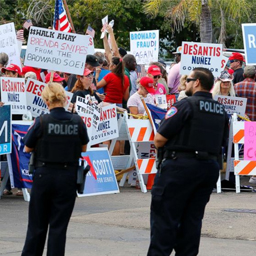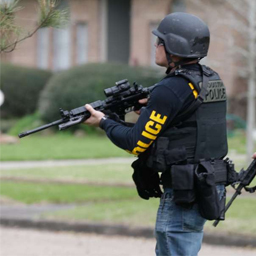Riots erupted in Nantes after French police shot dead a 22-year-old man, Aboubakar Fofana, during a stop-and-search operation.

The incident sparked two nights of non-stop violence and rioting. Protesters burned dozens of cars, hurled petrol bombs, and set alight many buildings in the Breil neighbourhood, including a library, a shopping centre, and a police station.
The same night, riots broke out in two other areas, Malakoff and Dervallieères. Rioters torched umpteen cars and buildings.
The violent mob set on fire a community centre on the Malakoff estate, burning down to ashes several children’s games and over 10,000 books.

Protesters chanted slogans – “killers, killers, shame on you” – and pelted stones at the deployed police force. In response, the police fired tear gas. Volunteers of local associations came out, trying to calm down the protesters.
Vehicles were on fire, there were fires in the bins, everything was burning, one volunteer said. A resident said, in two nights they destroyed everything we built in 20 years.
The most affected areas were the ones that French authorities describe as “sensitive”. Most of these places are run-down, where poverty, unemployment, and crime rates are high.
French Prime Minister, Édouard Philippe, visited Nantes and expressed his firm condemnation of rioting incidents. He extended his support to the police force and firefighters and praised them for their competence.
Prime Minister Philippe ensured the fullest transparency over the death of 22-year-old Aboubakar Fofana.
What The Police Claims?

Jean-Christophe Bertrand, the local police chief, said the shooting incident happened in the Breil district around 8.30 pm, when police officers stopped the rented Nissan car Fofana was driving.
When asked to produce identity papers, as necessary in France, Fofana refused to comply with the officer’s request, and instead, reversed his car and hit one officer. The officer’s colleague then fired, killing the young man.
According to police sources, Fofana suffered bullet injury in the carotid artery. The hospital declared him dead on arrival. It’s an unfortunate incident, Bertrand said.
The police confirmed that Fofana was under surveillance in a drug-trafficking case.
Le Monde, a French daily afternoon newspaper, reported that the police issued an arrest warrant against Fofana in 2017, for organized robberies.
Police Claims Contested By Witnesses

Eyewitnesses challenged the police, labelling their claims as fictitious and untrue.
Locals present during the incident said Fofana’s car was at a standstill, and the car injured no police officer.
Not willing to give her name, a woman who filmed the entire incident, said there was only the gunshot.
There was no police officer behind the car.
Fofana hit no one.
Justice Delivered?

The police watchdog opened an inquiry into the shooting and killing of the 22-year-old man.
The investigators took the police officer into custody for interrogation, who shot and murdered Fofana.
The Nantes prosecutor’s office announced the arrest of the officer, but said, the prosecutor can make the future proceedings of the case public only at the end of the interrogation.
Detectives are probing whether they should charge the police officer with “violence by a person of authority leading to manslaughter”, the office said.
Johanna Rolland, the Socialist mayor of the city of Nantes, asked for an independent investigation with transparency.
She sought full clarity on the death of Aboubakar Fofana.
This Is Not The Only Case Of Police Shooting

Aboubakar Fofana is not the first person in France who died of police shooting. Many families throughout the country struggle to get justice for their loved ones, who died under similar conditions.
For instance, in 2012, the French police shot 28-year-old Amine Bentounsi in the back and murdered him.
Following a long trial, the court found Damien Saboundjian, the police officer involved, guilty of premeditated assault. The police department suspended him for five years. Saboundjian did not spend a single day in jail. Later, he continued working as an officer.
The horrific stories of people who lost their lives in police shootings evoke serious concerns about institutionalized racism that plagues the French police.
Aboubakar Fofana and Amine Bentounsi were not white, just like most of France’s police shooting victims.


